"SLC-S25/W1 | Community World Tour : Traditional Cuisine"
"Traditional cuisine is not just food—it’s history served on a plate, seasoned with the stories of generations past."
I am from Nigeria, a place rich in traditional dishes that reflect various cultures and bring families and friends together, giving my country a timeless essence.
Out of the many traditional dishes we have, I have selected "Abacha (African salad)" to share with you. Come along on a community world tour to Nigeria!
Abacha, commonly known as African Salad, is a cherished traditional dish from southeastern Nigeria, especially among the Igbo community. This colorful, flavorful, and slightly tangy dish is made from cassava and is often enjoyed as a snack, a light meal, or during gatherings and ceremonies.
🔸 Main Ingredient:
Abacha: The main component is cassava tubers that are boiled, cut into thin strips, and then sun-dried. To make the dish, the dried abacha is soaked in warm water to soften it before combining it with other ingredients.
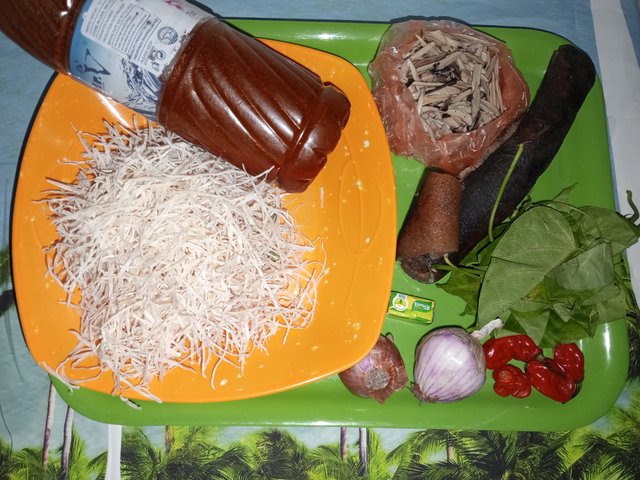 Ingredients Ingredients |  Mixed potash Mixed potash |
|---|
🔸 Key Ingredients:
Palm oil: Intensify the Abacha with its deep orange texture.
Potash (akanwu): A traditional alkaline salt that helps blend the palm oil into a smooth sauce.
Ugba (oil bean seed): Fermented and sliced, it contributes a strong, earthy taste.
Onions: Added raw or sautéed, sliced onions enhance the flavor.
Crayfish: Ground dried crayfish adds an extra umami kick.
Pepper: Scotch bonnet or chili peppers for spiciness.
Seasoning cubes and salt to taste.
Utazi leaves are for decoration.
Stockfish or kpomo (cow skin) may be included for added richness.
Ehuru (Calabash nutmeg) for fragrance (optional).
I still recall the first time I tried Abacha—not only the taste but also the sensation. It was a muggy afternoon in Enugu, and the yard was filled with laughter, the kind that comes after a fruitful harvest. Aunt Nneka, the family's unspoken leader, sat beneath the mango tree with a large red bowl resting on her lap. Her hands moved in a steady rhythm, blending abacha with palm oil, onions, and ugba, while she hummed an old folk tune in Igbo.
For Aunt Nneka, measurement was not needful as she relied on her instinct. A pinch of salt here, a handful of crayfish there; guided by her memory, not a recipe.
Children lingered nearby, stealing glances, waiting eagerly. When she finally beckoned us over, we gathered around like birds at dawn. One bite and the smoky flavor of oil bean seeds, the spicy pepper, and the crunch of softened cassava danced on my palate. But it was more than just tasty. It was home filled with stories, ancestors, and love.
Aunt Nneka looked at me and said, "This is not just salad. This is memory, child. You eat it, and you remember where you come from."
🔸 How It’s Made:
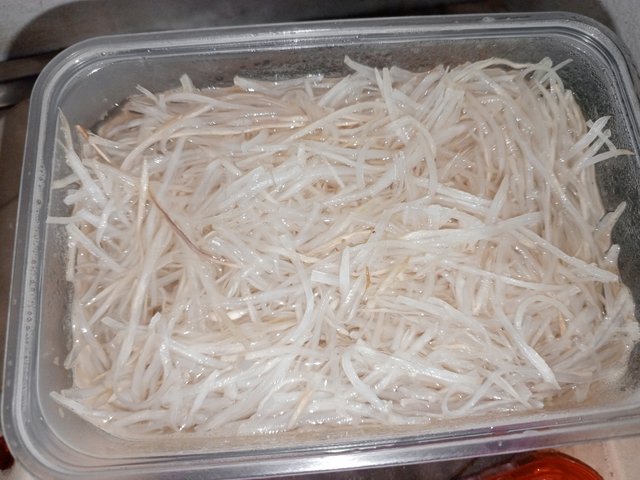 | 1. Soak abacha in warm water until it softens, then drain |
|---|
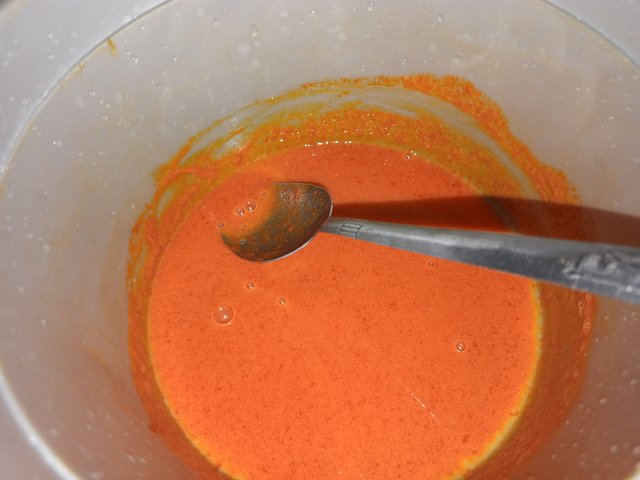 | 2. Combine palm oil and potash to create a thick orange paste |
|---|
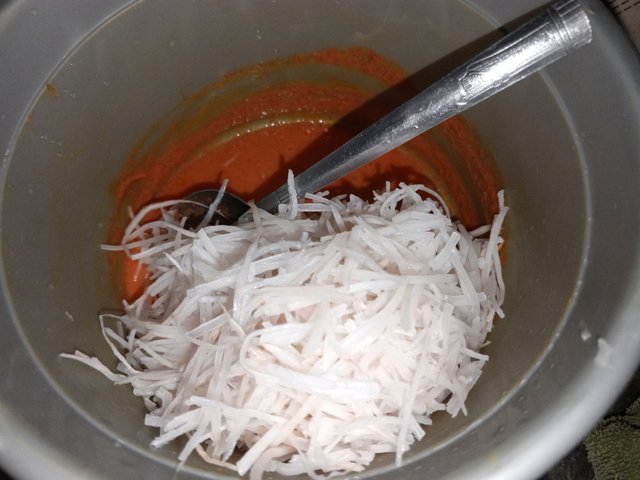 | 3. Mix in ground crayfish, pepper, onions, and seasonings, add the abacha and salt to taste |
|---|
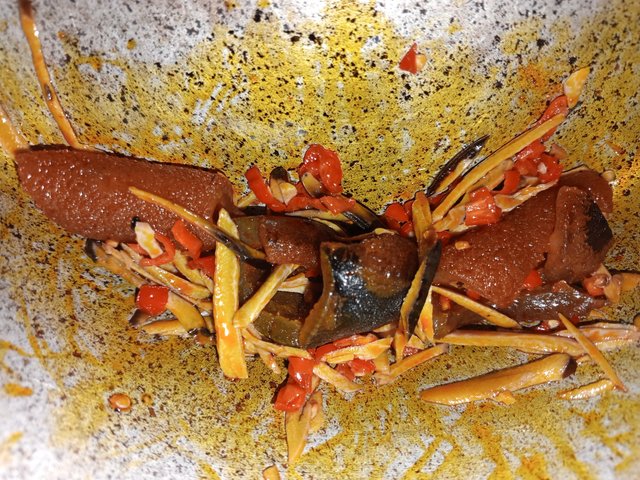 | 4. Add ugba, softened stockfish or kpomo in palm oil and stir fry |
|---|
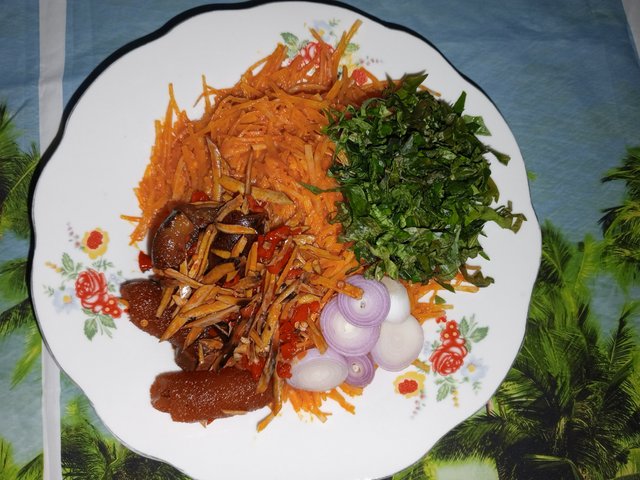 | 5. Mix well and garnish with sliced vegetables or leaves. |
|---|
Abacha is far beyond the regular dish, it symbolizes Igbo hospitality and tradition. It is often served at: Traditional weddings, village meetings, funerals or new yam festivals, family celebrations. Some people include fried mackerel, boiled eggs, or grilled meat, it's a choice but go in with whatever you prefer. I enjoy it more with palm wine (white wine).
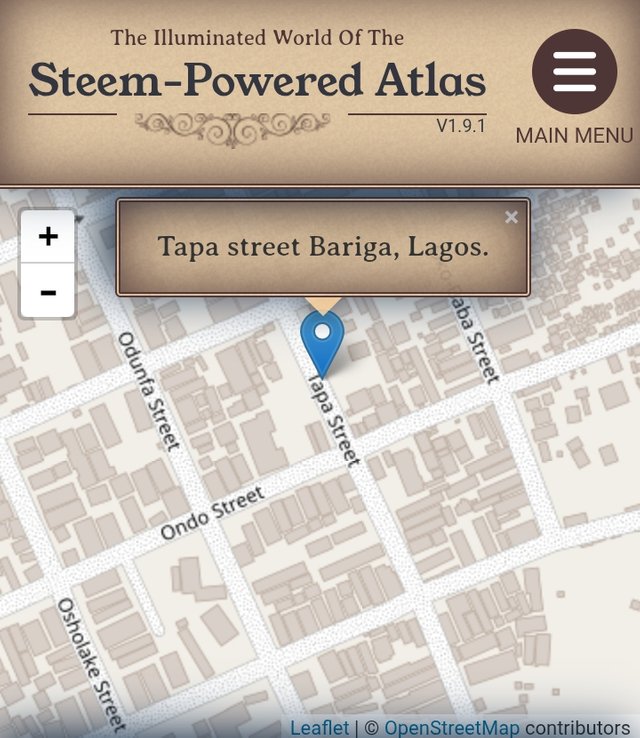 [//]:# (!steematlas 6.48773413 lat 3.3890301 long Tapa street Bariga, Lagos. d3scr)
[//]:# (!steematlas 6.48773413 lat 3.3890301 long Tapa street Bariga, Lagos. d3scr)
This is the location where this flavourful cuisine was prepared today. I am sure you don't want to miss out from my traditional cuisine.
"TYPE LESS, SMILE MORE"
Abacha is not a meal, it's a movement into different flavours, colors, taste, that speaks where words ends.
I invite @sergeyk @entity01 @m-princess
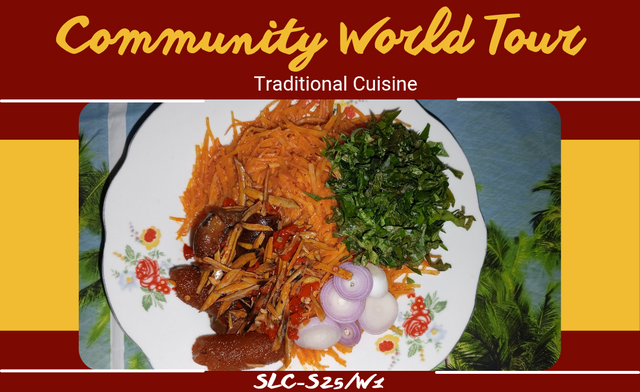

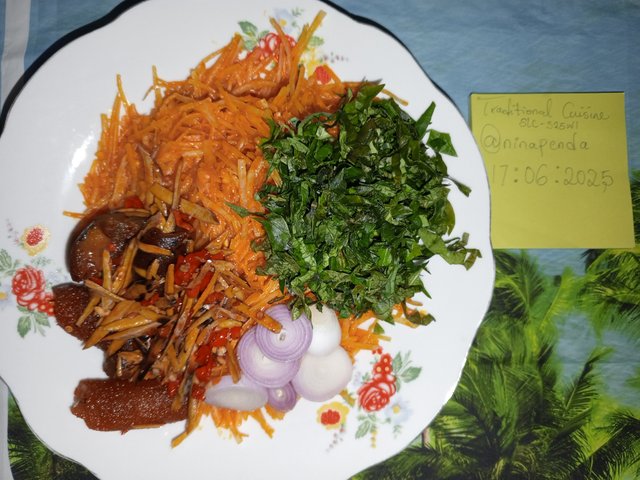

@tipu curate
Upvoted 👌 (Mana: 4/7) Get profit votes with @tipU :)
Abacha is a delight, when the cassava flasks is ready it makes the process very simple. I remembered when my uncle went for his introduction at IMO state that was the first food they gave us as in-laws. Since then I learned how important it can be in Igbo land. Cheers my friend @ninapenda
𝑯𝒎𝒎, 𝒊𝒕𝒔 𝒗𝒆𝒓𝒚 𝒊𝒎𝒑𝒐𝒓𝒕𝒂𝒏𝒕 𝒊𝒏 𝒕𝒉𝒆 𝒊𝒈𝒃𝒐 𝒄𝒖𝒍𝒕𝒖𝒓𝒆, 𝒘𝒆 𝒔𝒖𝒓𝒆 𝒄𝒂𝒏'𝒕 𝒅𝒐 𝒘𝒊𝒕𝒉𝒐𝒖𝒕 𝒊𝒕. 𝑻𝒉𝒂𝒏𝒌 𝒚𝒐𝒖 𝒔𝒐 𝒎𝒖𝒄𝒉!
Oh my God... Now I'm craving ugba.
Beautifully prepared and captured.
𝑻𝒉𝒂𝒏𝒌 𝒚𝒐𝒖!
I really enjoyed learning about Abacha—your description made it feel so alive and full of culture. The way you shared your memory with Aunt Nneka under the mango tree was just heartwarming.
𝑻𝒉𝒂𝒏𝒌 𝒚𝒐𝒖 𝒎𝒚 𝒇𝒓𝒊𝒆𝒏𝒅!
Saludos amiga cada día aprendemos algo nuevo!! Esta ensalada africana se ve estupenda dónde combina colores y sabores! Gracias por presentar este plato emblemático de Nigeria!
Te deseo muchos éxitos y bendiciones 🤗
𝑻𝒉𝒂𝒏𝒌 𝒚𝒐𝒖 𝒎𝒚 𝒇𝒓𝒊𝒆𝒏𝒅 𝒇𝒐𝒓 𝒚𝒐𝒖𝒓 𝒘𝒂𝒓𝒎 𝒓𝒆𝒔𝒑𝒐𝒏𝒔𝒆
The way you painted the memory of Aunt Nneka under the mango tree stirred something deep in me. You didn’t just share a recipe, you shared a legacy, a whole world wrapped in flavour, family, and culture.
Abacha has always been one of those dishes that remind us that food is more than nourishment, it’s memory, it’s ancestry, it’s belonging. That quote, “This is not just salad. This is memory, child,” hit me like a warm breeze from home. Goosebumps.
Thank you for this rich offering. The visuals, the step-by-step guide, the backstory, everything came together so beautifully. I left this post feeling full in more ways than one. You’ve done justice not just to a dish, but to the heritage it carries.
🫶🏾 More than a meal, this truly was a movement.
Your storytelling is flavour on its own.
𝑰 𝒂𝒑𝒑𝒓𝒆𝒄𝒊𝒂𝒕𝒆 𝒚𝒐𝒖𝒓 𝒓𝒆𝒔𝒑𝒐𝒏𝒔𝒆 𝒎𝒚 𝒇𝒓𝒊𝒆𝒏𝒅, 𝒕𝒉𝒘𝒏𝒌 𝒚𝒐𝒖!
You are welcome.
I have been reading about cassava in almost every recipe and wondering if it is the main food of your country along with meat? We have a large production of this starchy item but most of it is used to abstract starch from it (Topioca) People use it as complete meal too but after reading your post I am sure it can be turned into staple food. All the best for this contest!
𝑻𝒉𝒂𝒏𝒌 𝒚𝒐𝒖 𝒔𝒐 𝒎𝒖𝒄𝒉, 𝑰 𝒂𝒑𝒑𝒓𝒆𝒄𝒊𝒂𝒕𝒆 𝒚𝒐𝒖𝒓 𝒓𝒆𝒔𝒑𝒐𝒏𝒔𝒆! 𝑨𝒏𝒅 𝒕𝒉𝒊𝒔 𝒓𝒆𝒄𝒊𝒑𝒆 𝒄𝒐𝒖𝒍𝒅 𝒔𝒆𝒓𝒗𝒆 𝒂𝒔 𝒎𝒂𝒊𝒏 𝒅𝒊𝒔𝒉 𝒐𝒓 𝒔𝒊𝒅𝒆 𝒅𝒊𝒔𝒉 𝒅𝒆𝒑𝒆𝒏𝒅𝒊𝒏𝒈, 𝒃𝒖𝒕 𝒎𝒐𝒔𝒕𝒍𝒚 𝒅𝒐𝒏𝒆 𝒐𝒄𝒄𝒂𝒔𝒊𝒐𝒏𝒂𝒍𝒍𝒚.
Thank you @ninapenda, for your participation in Week 1 of the Community World Tour on Traditional Cuisine! Here's a detailed evaluation of your entry based on the official 10-point criteria:
Total Score: 7.5 / 10
A rich and beautifully written post that celebrates Igbo culture through food and memory. The narrative is particularly strong and touching. With a short video and more community engagement, you could easily reach a perfect score in future entries.
Thank you once again for your touching and culturally valuable participation in our challenge. We truly appreciate your contribution.
— Community World Tour Jury
𝑻𝒉𝒂𝒏𝒌 𝒚𝒐𝒖 𝒇𝒐𝒓 𝒕𝒉𝒆 𝒈𝒓𝒂𝒅𝒊𝒏𝒈. 𝑰 𝒌𝒏𝒐𝒘 𝑰'𝒍𝒍 𝒅𝒐 𝒃𝒆𝒕𝒕𝒆𝒓 𝒊𝒏 𝒇𝒖𝒕𝒖𝒓𝒆 𝒆𝒏𝒕𝒓𝒊𝒆𝒔 𝒔𝒊𝒓.
Nice entry… Abacha was an addiction for us as kids as mum makes it every fourth night in the house. It was my favourite as a child and still remains my traditional favourite. Eating it or seeing it simply reminds me of home.
Oh you just make me crave for this abacha, I like it so much. It just reminds me of how I craved for it when I was pregnant, I liked it but I never prepare it before, I will give it a trial some day.
Thank you for sharing, wishing you success 👍